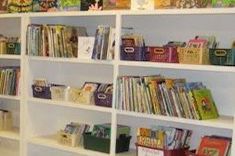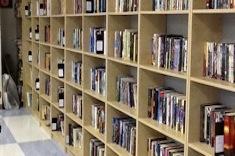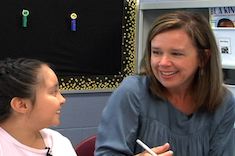Articles
Here is where you’ll find all the latest print features from our contributors. If you’d like to browse specifically by grade level, topic, or contributor, you can use the links in the right sidebar.
Latest Content
Vertical Whiteboards
Tammy Mulligan shares how vertical whiteboards are a powerful tool to support collaboration and make student thinking visible.
Indoor Walks
Gigi McAlister discovered that using indoor walks is a way to help students engage in their learning and strengthen their learning community through conversations.
Pick One: How to Establish a Community of Readers
“Pick one!” These are the words that begin to grow a community of readers. When students say, “I’m done,” Becca Burk points toward the classroom library and encourages them to pick a book and begin growing strong roots as a reader.
Reclaiming Space: Weeding to Grow a Healthy Library
Books, like gardens, need to be tended to regularly for the whole library to thrive. Gigi McAllister gives tips for anyone in the weeding process for their school or classroom library.
You Know How to Show Them
Becca Burk tackles the issues associated with distraction when it comes to helping students engage with a book rather than a device.
I Don’t Hate Graphic Organizers
Vivian Chen challenges us to replace an overly prescriptive handout that dictates the contents of a paragraph or essay with more open-ended organizers and exemplars to help students plan and write with more independence.
Bit by Bit: Lifting the Level of Storytelling
Melissa Quimby shifts the way she helps students approach narrative writing by focusing on the conflict and encouraging students to unfold it bit by bit. This small shift lifts the level of the stories students write—you can try it, too!
Responding to Dysregulated Behavior: How to Move Forward
Becca Burk shares how to move forward in healthy ways after the extreme situation of a student dislocating her knee. This is the final installment of a four-part series chronicling the responses when a student with dysregulated behaviors joins Becca’s kindergarten class mid-year.
My Student Is Risk Averse
Molly James explains the difference between shyness and risk aversion.
Morning Hike
Gwen Blumberg helps us consider and create space for a variety of personalities and learning needs. Inspired by a morning hike, she takes her observations and applies them to give space for all students to learn.
Responding to Dysregulated Behaviors: What About the Other Kids?
Becca Burk reflects on the other kids in the classroom who witness dysregulated behaviors from a classmate. She reminds us of the way grace and acceptance are prominent when we look for the silver linings in difficult situations. This is the third installment of a four-part series chronicling the responses when a student with dysregulated behaviors joins Becca Burk’s kindergarten class mid-year.
Responding to Dysregulated Behaviors: A Symptom of What?
When a new student spirals into anxiety and becomes aggressive, Becca Burk finds herself with a dislocated knee and advocating for the student to return to the classroom. This is the second installment of a four-part series chronicling the responses when a student with dysregulated behaviors joins Becca Burk’s kindergarten class mid-year.
A Poetic Beginning
Tara Barnett and Kate Mills use poetry to help students discover writing ideas. Inspired by three poems, students share their notebook entries and poems from the first days of a new school year.
Let’s Begin
Gwen Blumberg reflects on the community developed at a writing retreat and encourages teachers to consider the community of learners they will intentionally nourish this school year.
Responding to Dysregulated Behaviors: “What’s a Book?”
When a new student joins Becca Burk’s kindergarten classroom and asks, “What’s a book?” Becca realizes some behaviors are new to even the most veteran teachers. This is the first installment of a four-part series chronicling the responses when a student with dysregulated behaviors joins Becca Burk’s kindergarten class mid-year.
Do I Belong?
Tammy Mulligan considers ways to help students feel and know that they belong in the classroom community. The more we broaden our knowledge of others, and discover more about who we are and what we care about, the more our sense of belonging can grow.
Kindergarten Celebration of Writing
Molly James encourages us to consider ways to make a writing celebration meaningful. You’ll be inspired by her kindergarten writing celebration.
Revisiting: Getting to Know My Students
Mandy Robek decided that despite the increasing pressures and time-consuming expectations, she will nourish healthy relationships with students. Here are some tried-and-true practices that she wants to maintain.
Fostering Reading Lives in the Library
Gigi McAllister fosters engaged reading lives through goal-setting in the library. She shares ways we can encourage all readers to have robust reading lives.
Advice from Hanks
Becca Burk shares three tips Tom Hanks gave to educators during a keynote address at NCTE. If you’re looking for inspiration, this is just the article for you!
Story Walks
Christy Rush-Levine invites students into a story walk. While many of our school activities require students to sit still and be quiet, story walks with wordless books are a simple way to invite students to move and talk, with powerful outcomes.
Early Writing Opportunities in the Library
Gigi McAllister shares informal writing opportunities for students in the school library. Informal and engaging writing activities where students have lots of choice and encouragement make them feel empowered as writers, help them generalize the writing skills they are learning in the classroom, and create joyful writing experiences.
Tips for Interactive Word Study
Lisa Mazinas offers tips for building fluency in elementary readers.
Fluency Practice in Middle School
Leigh Anne Eck tackles fluency strategies with her middle school readers.
Eight Tips to Make Virtual Learning Equitable and Accessible for All Students
Lisa Mazinas reminds us of ways to make virtual learning equitable and accessible.
Responding to Appeals for Help
Dana Murphy outlines three options to respond to a student who is stuck when reading and looking to the teacher for the answer. By being mindful when students appeal for help, we can make intentional, on-the-spot decisions to empower students to become better readers.
Purposeful Play
Jodie Bailey makes a case for purposeful play with her middle school students. To strengthen reading habits, we offer exposure to a wide variety of books, time to read, and opportunities to discuss ideas. In math classrooms, students need similar opportunities to explore and play.
The Power of Story
Becca Burk reminds us of the power of story and community when she uses a social story to help a kindergartner overcome the fear and anxiety from being forgotten on the bus. Becca shows us how to use a social story to develop confidence to overcome difficulties.
Your Voice Matters
Jodie Bailey shares a picture-book version of Martin Luther King Jr.’s I Have a Dream speech and then gives students time to reflect on the message. While math class might seem like an unusual place to help students consider their identity and place in the world, Jodie inspires teachers to offer space and time for students to find their voice…while making direct connections to math standards.
Examining Power Dynamics
Gretchen Schroeder leads her students to consider the power and privilege in the texts they read. By creating a power continuum, students become more aware of issues of power and oppression in society. Once this happens, they can move to discussions of how to take action for positive social change.
Browse Content By
Type
Category
- Assessment Tools
- Big Fresh Archives
- Booklists
- Choice Numeracy
- Classroom Design
- Common Core
- Community Building
- Conferring
- Content Literacy
- Digital Literacy
- English Language Learners
- Equity
- Family Relations
- Free Samples
- Guiding Groups
- Leadership
- Literacy Coaches
- Mentor Texts
- Minilessons
- New Teacher Mentors
- Podcasts
- Poetry
- Quote Collections
- Reading Strategies
- Self Care
- Struggling and Striving Learners
- Talking and Listening
- Teacher Study Groups
- Teaching Reading
- Teaching Writing
- Word Study and Vocabulary
Author
- Melissa Quimby
- Nawal Qarooni
- Gwen Blumberg
- Julie Cox
- The Lead Learners
- Hannah Tills
- Josie Stewart
- Ruth Metcalfe
- Mallory Messenger
- Becca Burk
- Jodie Bailey
- Vivian Chen
- Mary Brower
- Tiffany Abbott Fuller
- Stephanie Affinito
- Ruth Ayres
- Leigh Anne Eck
- Heather Fisher
- Shari Frost
- Julie Johnson
- Suzy Kaback
- Gigi McAllister
- Shirl McPhillips
- Melanie Meehan
- Cathy Mere
- Debbie Miller
- Tara Barnett and Kate Mills
- Tammy Mulligan
- Dana Murphy
- Bitsy Parks
- David Pittman
- Brenda Power
- Heather Rader
- Matt Renwick
- Mandy Robek
- Christy Rush-Levine
- Gretchen Schroeder
- Jen Schwanke
- Brian Sepe
- Katherine Sokolowski
- Stella Villalba
- Jennifer Vincent
Grade Level
Choice Literacy Membership
Articles
Get full access to all Choice Literacy article content
Videos
Get full access to all Choice Literacy video content
Courses
Access Choice Literacy course curriculum and training



























